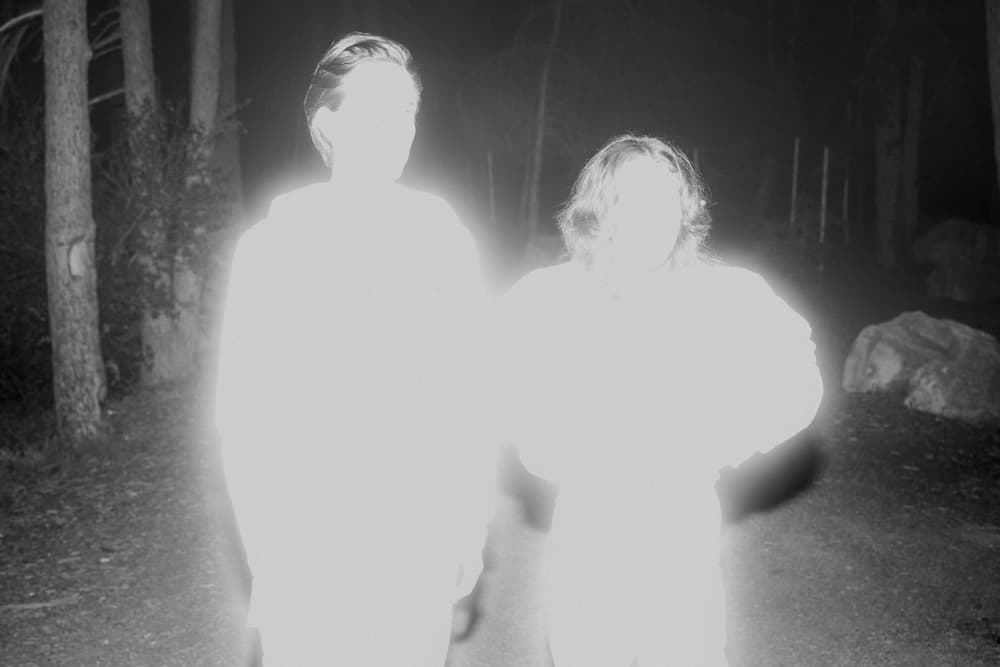Purity Ring are reborn on new album ‘Womb’
If you ever tried to make yourself look cool on Tumblr, you probably also listened to Purity Ring. In the early 2010s, the duo emerged out off the darkwave hype with a brand of bad-dream-pop that set the girlish, whispery vocals of singer Megan James against synth-heavy, spooky production by bandmate Corin Roddick. Emerging at a time when fellow Canadian Grimes and a host of other bands, like Poliça and Phantogram, were playing with the boundaries of what “pop” could mean, they represent a cultural moment where “alternative” was an aspirational identity in and of itself.
Five years on, they’re debuting their third album in a drastically different landscape, one dominated by algorithm-led playlists and where independent music venues continue to rapidly close. As has always been the case, it’s sounding like somebody else rather than standing out that’s the key to success – now there’s just less room for resistance. But Purity Ring have proven that they’re still pop’s outsiders with Womb: a project that continues to reject definitions of what the genre ‘should’ sound like whilst marking a stage of newfound maturity for the band. Building on Megan’s talent forThe Bloody Chamber-style lyrical viscera, each track is crafted from shards of her poetry and paired with tight, purpose-led electronica. Where once lyrics and music were vying for attention, they’re now a symbiotic match.
To celebrate the LP’s release, HUNGER called vocalist Megan from her Los Angeles home to talk about Purity Ring’s musical journey so far and why Womb is an album that provides a much-needed lesson in “being content with discontenting circumstances”.
How have you been keeping yourself busy in self-isolation? Besides promoting the album, of course.
I’m in LA and my family’s in Canada so I’m naturally pretty worried but apart from that, I’m happy to stay home. With Corin, I’ve been working on a few music video ideas, which has been an interesting process in quarantine days. I’ve been making bread and have also been trying to grow things in my garden. And then I’ve been doing the things that I’m sure everybody else is doing: cleaning a lot and rearranging everything in my house.
Yeah, we’re all in a similar boat! So let’s get talking about music, I’m sure your fans are really curious about the five year gap between another eternity and WOMB. Why such the long wait?
To be honest, time just passed and we were like ‘wow, okay, it’s been five years’. We’ve always written really slow. We also toured another eternity for maybe two or three years and when we stopped we both had to come down and be alone for at least a year to become ourselves again. Then in the process of making the album, we took it really slow and let everything grow into itself and be whatever it was asking to be. We didn’t make a deadline until we knew we had most of the songs already and just let it come together as naturally as it could.
That definitely makes sense. But I also hear Purity Ring worked with Katy Perry on her Witness album during that break, what was that experience like?
It was an experience that I’m grateful to have had. It made me feel like the way we approach our music is right for us and made me feel better about how we write music. A lot of other musicians don’t work like this but it’s just the two of us writing together and I feel like if we tried to add more people into the equation we wouldn’t have the same satisfaction in what we make.

A ‘seizing the means of production’ ethos, then! To be honest, I was actually really surprised to hear that you’d been working with Katy Perry, your music is so different to hers. Or am I missing something?
Yeah, I really wouldn’t define our projects alongside hers, I think it’s very different. We didn’t work on our own stuff when we were working with her and it was a long time ago now! It all feels less significant than it sounds.
The alternate music landscape also seems to have really changed between Another Eternity and Womb. In the early and mid-2010s, it felt like Purity Ring had a place within a wave of artists who were really proud to be alternative. Now you’re kind of striking out on your own.
I agree, there was a kind of renaissance of Canadian artists…or at least there was a bunch of people recognising Canadian artists. It just so happened that there was an indie-pop sound going on around the world at the time, and a lot of it seemed to be coming from Canada. I don’t what that wave is called – there was an earlier scene, with people like Broken Social Scene and Feist in the early 2000s – but there was another wave and we were a part of it. I think grouping us all together in terms of sound was something the world did at the time but I always felt like Purity Ring didn’t necessarily fit into these categories.
So has avoiding categorisation been something you’ve consciously tried to do?
I guess Purity Ring has always made our own definition of pop music. Being in the music industry for ten years now, I know that my idea of pop music is very different from how a lot of people who write exclusively in that genre would define it. We’ve always been trying to make songs that we haven’t done before and to challenge ourselves to make something new.
Let’s talk about the new LP. I think its predecessor Another Eternity was more ethereal and, before that, Shrines was a lot darker. How would you say the third album fits in musically with what you’ve released before?
If I were to explain the albums as physical locations, which I do sometimes, I’d say Shrines felt like it was buried deep underground and Another Eternity felt like it was up in the clouds. With this one, it’s in-between but neither, it feels like one sphere inside of me. But it’s not just about me, it’s also about people in my life and coming to terms with how I saw those people. I feel like each record is a phase of my life and this is yet another.
I think you can really hear a new sense of groundedness on the most recent LP. What’s surprising though is that the album’s title, Womb, kind of suggests these ideas of new beginnings, or just starting out. What was the reasoning behind the choice of name?
Probably about a year ago, we had about seven songs that would go on the record and I listened to them all together for the first time. I just felt so comforted and I almost immediately thought ‘I hope other people can feel that too’. A lot of the songs are just about being content with discontenting circumstances and a lot of it is trying to create a resting place from those less than ideal circumstances. I thought the title ‘Womb’ was really fitting for that.
It’s not just your sound that’s changed in the years you’ve been in Purity Ring, you must have also changed as both a person and an artist, right? How would you say you’ve matured?
I always feel like the day I turned thirty everything changed. Like I turned over a new leaf. There’s a lot of my twenties which were a question mark but I feel more settled and confident now than I’ve ever felt before. As an artist, when it came to the poetry and the lyrics on the new album, I was able to take a step back from myself and write about the things and people around me more than I’ve ever done before. I’m also more aware of how Purity Ring works as a band, both the strong things and the weak things.
Purity Ring’s latest album, Womb, is available to stream and download now.

